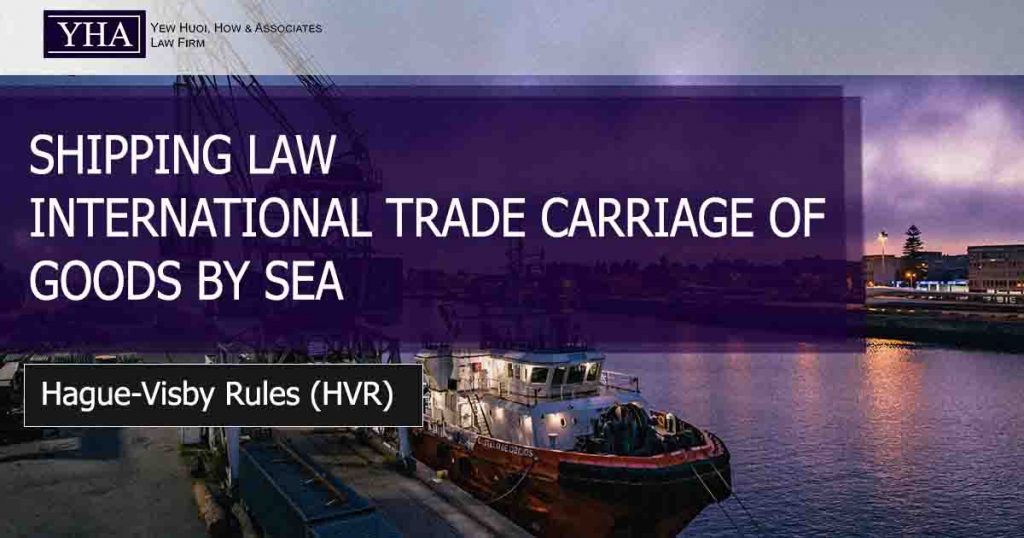Q: What are the changes in the Hague-Visby Rules in Malaysia.
A: The Hague-Visby Rules were recently on 15.7.2021 incorporated to replace the Hague Rules used in Malaysia since independence in our Carriage of Goods by Sea Act 1950 (“the Amended COGSA”). However, not all the provisions in Hague-Visby Rules apply. The following table will set out the changes in Amended COGSA.
| Subject | Hague Rules (1924) That Apply Before Amendment | Hague-Visby Rules (1968) That Apply After the Amendment |
| Preliminary | · Drafted in 1924 in Brussels. | o Amendment to the Hague Rules by Brussels Amendments in 1968. |
| Scope of Application | · Applies to contract of carriage covered by a bill of lading (“BL”). | o Article X of the Hague-Visby Rules is NOT applicable in Malaysia. The Amended COGSA has inserted Article 1A instead.
o The new rules apply to sea carriage document (“SCD”) either in electronic or printed form. o Sea carriage document (“SCD”) means: i. BL; ii. Negotiable document of title similar to BL that contains evidence of contract of carriage of goods by sea; iii. Non-negotiable BL; iv. Non-negotiable documents including consignment note and sea waybill or ship’s delivery order which contains evidence of contract of carriage of goods by sea. |
| Types of Cargo | “Goods” includes goods, wares, merchandises, and articles of every kind whatsoever, except live animals and cargo which by the contract of carriage is stated as being carried on deck and is so carried. | “Goods” includes goods, wares, merchandises, and articles of every kind whatsoever, except live animals.
The Hague-Visby Rules in the Amended COGSA apply to goods carried on deck; although the original Hague-Visby Rules do not. |
| Proof of Condition of Cargo | · BL is prima facie evidence of receipt by the carrier of the condition of the goods. However, this prima facie evidence can be challenged by evidence stating to the contrary. | o The Amended COGSA uses the term sea carriage document (SCD) rather than BL. SCD covers a wider range of document other than BL.
o SCD is prima facie evidence of receipt by the carrier of the condition of the goods. No evidence to the contrary shall be admissible to challenge the prima facie evidence when the SCD is transferred to a third party in good faith. |
| Obligations of Carrier | · The carrier has no further liability or responsibility in respect of cargo loss or damage after one (1) year. Beginning from the date of delivery. | o The 1-year time bar may be extended if both parties agree.
o An action for indemnity against a third party may be brought even after one (1) year. |
| Limitation of Liability | · If the value of the cargo is not declared before shipment and inserted in the BL, the carrier or the ship is NOT liable for any loss or damage of the goods exceeding 100 sterling pounds per package or unit. | o If the value of the cargo is not declared before shipment and inserted in the SCD, the, the carrier or the ship is NOT liable for any loss or damage of the goods exceeding 666.67 units of account per package OR unit or units of account per kilo of gross weight of the goods lost or damaged, whichever higher.
o The total amount recoverable shall be calculated by reference to the value of the goods at the place the goods are discharged. o The value of the goods shall be fixed according to the commodity exchange price, or current market price, or value of the goods of the same kind and quality. o Where a container, pallet or similar article of transport is used to consolidate goods, the number of packages or units used in the SCD as packed in such article of transport shall be deemed the number of packages or units. o The unit of account mentioned is as defined by International Monetary Fund (“IMF”). o However, the carrier or the ship is not entitled to the benefit of limitation of liability if it is proved that the damage is caused by willful negligence of the owner.
|
| shall be deemed the number of packages or units.
o The unit of account mentioned is as defined by International Monetary Fund (“IMF”). o However, the carrier or the ship is not entitled to the benefit of limitation of liability if it is proved that the damage is caused by willful negligence of the owner. |
Q: Why Malaysia only applies the Hague-Visby Rules now?
A: Generally, it is a common knowledge that limitation of liability clause in the Hague Rules favours the carrier or the ship. Malaysia has not applied the Hague-Visby Rules until the year 2020 as we are a maritime nation that favours the right of the shipowner. However, as time passes by, Malaysia has gradually progressed to diversify its economy to place more emphasis on equalizing the rights and liability of both cargo owners and shipowners. This is why the Hague Rules were replaced with a more balanced and up-to-date Hague-Visby Rules. Our Amended COGSA has improvised the Hague-Visby Rules to include Sea Carriage Documents transmitted electronically.


